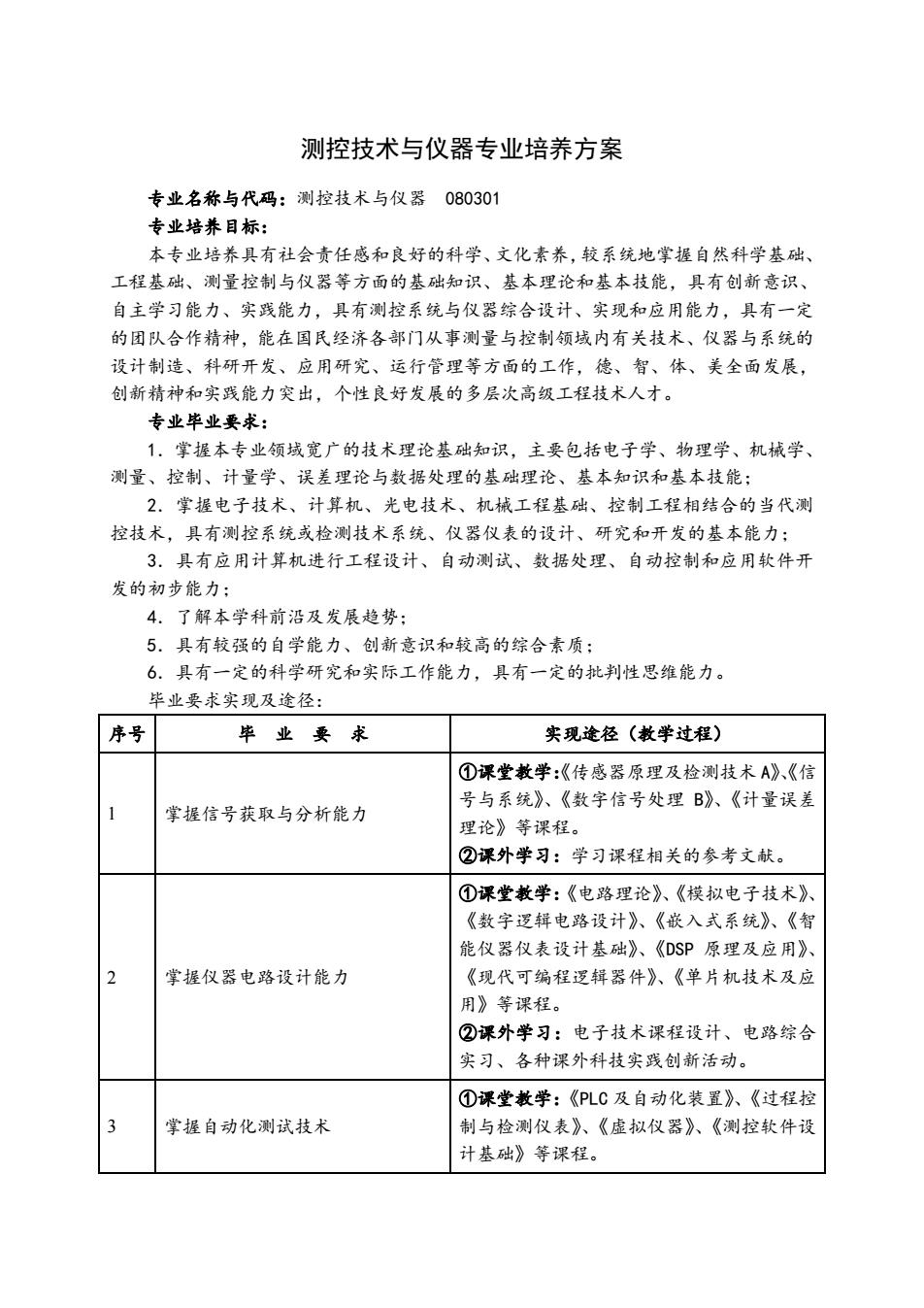
测控技术与仪器专业培养方案 专业名称与代码:测控技术与仪器080301 专业培养目标: 本专业培养具有社会责任感和良好的科学、文化素养,较系统地掌握自然科学基础、 工程基础、测量控制与仪器等方面的基础知识、基本理论和基本技能,具有创新意识、 自主学习能力、实践能力,具有测控系统与仪器综合设计、实现和应用能力,具有一定 的团队合作精神,能在国民经济各部门从事测量与控制领域内有关技术、仪器与系统的 设计制造、科研开发、应用研究、运行管理等方面的工作,德、智、体、美全面发展, 创新精神和实践能力突出,个性良好发展的多层次高级工程技术人才。 专业毕业要求: 1.掌握本专业领域宽广的技术理论基础知识,主要包括电子学、物理学、机械学、 测量、控制、计量学、误差理论与数据处理的基础理论、基本知识和基本技能: 2.掌握电子技术、计算机、光电技术、机械工程基础、控制工程相结合的当代测 控技术,具有测控系统或检测技术系统、仪器仪表的设计、研究和开发的基本能力: 3.具有应用计算机进行工程设计、自动测试、数据处理、自动控制和应用软件开 发的初步能力: 4.了解本学科前沿及发展趋势: 5.具有较强的自学能力、创新意识和较高的综合素质: 6.具有一定的科学研究和实际工作能力,具有一定的批判性思维能力。 毕业要求实现及途径: 序号 毕业要求 实现途径(教学过程) ①课堂教学:《传感器原理及检测技术A》、《信 号与系统》、《数字信号处理B》、《计量误差 掌握信号获取与分析能力 理论》等课程。 ②课外学习:学习课程相关的参考文献。 ①课堂教学:《电路理论》、《模拟电子技术》、 《数字逻辑电路设计》、《嵌入式系统》、《智 能仪器仪表设计基础》、《DSP原理及应用》、 掌握仪器电路设计能力 《现代可编程逻辑器件》、《单片机技术及应 用》等课程。 ②课外学习:电子技术课程设计、电路综合 实习、各种课外科技实践创新活动。 ①课堂教学:《PLC及自动化装置》、《过程控 3 掌握自动化测试技术 制与检测仪表》、《虚拟仪器》、《测控软件设 计基础》等课程
测控技术与仪器专业培养方案 专业名称与代码:测控技术与仪器 080301 专业培养目标: 本专业培养具有社会责任感和良好的科学、文化素养,较系统地掌握自然科学基础、 工程基础、测量控制与仪器等方面的基础知识、基本理论和基本技能,具有创新意识、 自主学习能力、实践能力,具有测控系统与仪器综合设计、实现和应用能力,具有一定 的团队合作精神,能在国民经济各部门从事测量与控制领域内有关技术、仪器与系统的 设计制造、科研开发、应用研究、运行管理等方面的工作,德、智、体、美全面发展, 创新精神和实践能力突出,个性良好发展的多层次高级工程技术人才。 专业毕业要求: 1.掌握本专业领域宽广的技术理论基础知识,主要包括电子学、物理学、机械学、 测量、控制、计量学、误差理论与数据处理的基础理论、基本知识和基本技能; 2.掌握电子技术、计算机、光电技术、机械工程基础、控制工程相结合的当代测 控技术,具有测控系统或检测技术系统、仪器仪表的设计、研究和开发的基本能力; 3.具有应用计算机进行工程设计、自动测试、数据处理、自动控制和应用软件开 发的初步能力; 4.了解本学科前沿及发展趋势; 5.具有较强的自学能力、创新意识和较高的综合素质; 6.具有一定的科学研究和实际工作能力,具有一定的批判性思维能力。 毕业要求实现及途径: 序号 毕 业 要 求 实现途径(教学过程) 1 掌握信号获取与分析能力 ①课堂教学:《传感器原理及检测技术 A》、《信 号与系统》、《数字信号处理 B》、《计量误差 理论》等课程。 ②课外学习:学习课程相关的参考文献。 2 掌握仪器电路设计能力 ①课堂教学:《电路理论》、《模拟电子技术》、 《数字逻辑电路设计》、《嵌入式系统》、《智 能仪器仪表设计基础》、《DSP 原理及应用》、 《现代可编程逻辑器件》、《单片机技术及应 用》等课程。 ②课外学习:电子技术课程设计、电路综合 实习、各种课外科技实践创新活动。 3 掌握自动化测试技术 ①课堂教学:《PLC 及自动化装置》、《过程控 制与检测仪表》、《虚拟仪器》、《测控软件设 计基础》等课程
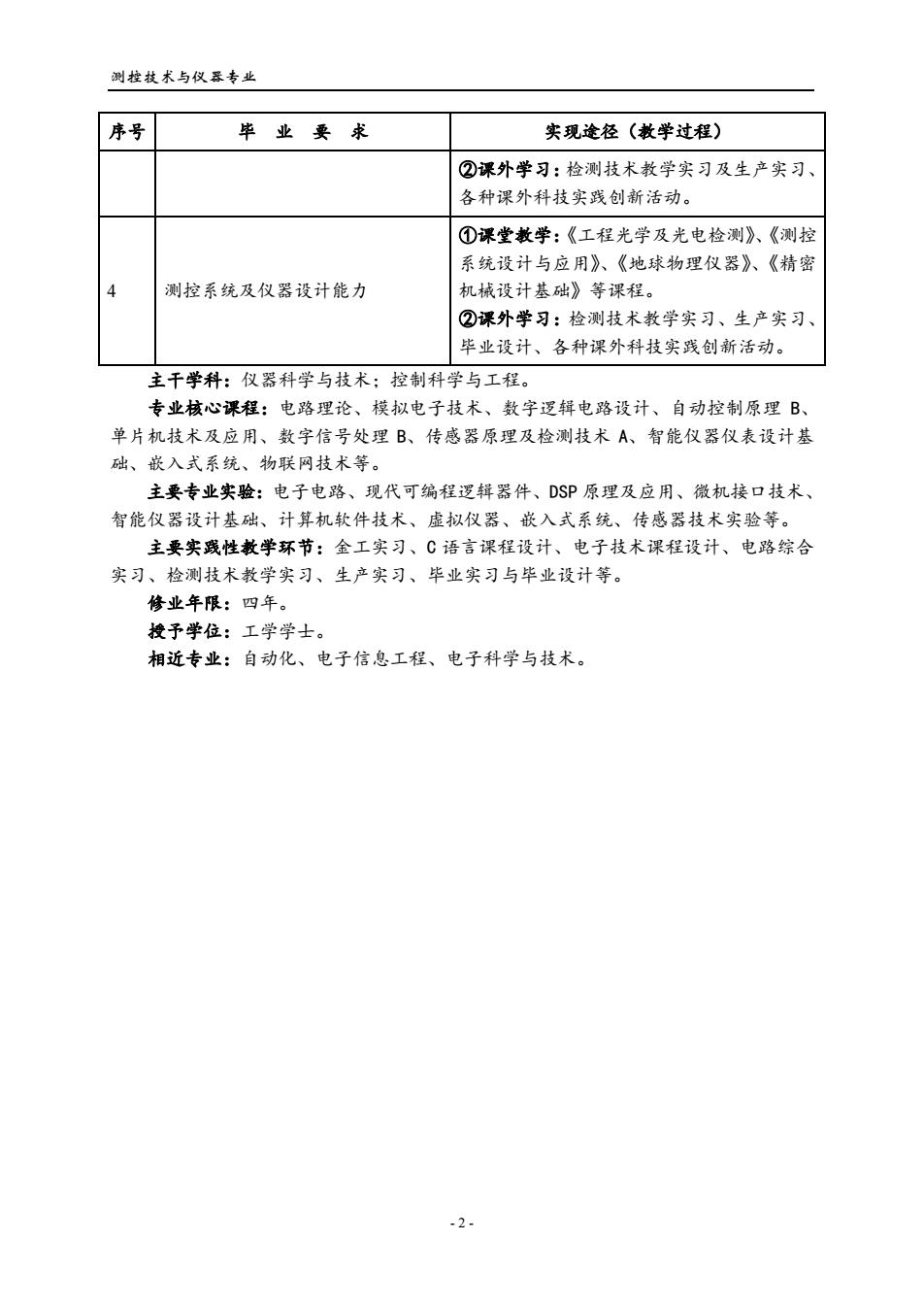
测控技术与仪器专业 序号 毕业要求 实现途径(教学过程) ②课外学习:检测技术教学实习及生产实习、 各种课外科技实践创新活动。 ①课堂教学:《工程光学及光电检测》、《测控 系统设计与应用》、《地球物理仪器》、《精密 测控系统及仪器设计能力 机械设计基础》等课程。 ②课外学习:检测技术教学实习、生产实习、 毕业设计、各种课外科技实践创新活动。 主干学科:仪器科学与技术;控制科学与工程。 专业核心课程:电路理论、模拟电子技术、数字逻辑电路设计、自动控制原理B、 单片机技术及应用、数字信号处理B、传感器原理及检测技术A、智能仪器仪表设计基 础、嵌入式系统、物联网技术等。 主要专业实验:电子电路、现代可编程逻辑器件、DSP原理及应用、微机接口技术、 智能仪器设计基础、计算机软件技术、虚拟仪器、嵌入式系统、传感器技术实验等。 主要实践性教学环节:金工实习、C语言课程设计、电子技术课程设计、电路综合 实习、检测技术教学实习、生产实习、毕业实习与毕业设计等。 修业年限:四年。 授予学位:工学学士。 相近专业:自动化、电子信息工程、电子科学与技术。 -2-
测控技术与仪器专业 - 2 - 序号 毕 业 要 求 实现途径(教学过程) ②课外学习:检测技术教学实习及生产实习、 各种课外科技实践创新活动。 4 测控系统及仪器设计能力 ①课堂教学:《工程光学及光电检测》、《测控 系统设计与应用》、《地球物理仪器》、《精密 机械设计基础》等课程。 ②课外学习:检测技术教学实习、生产实习、 毕业设计、各种课外科技实践创新活动。 主干学科:仪器科学与技术;控制科学与工程。 专业核心课程:电路理论、模拟电子技术、数字逻辑电路设计、自动控制原理 B、 单片机技术及应用、数字信号处理 B、传感器原理及检测技术 A、智能仪器仪表设计基 础、嵌入式系统、物联网技术等。 主要专业实验:电子电路、现代可编程逻辑器件、DSP 原理及应用、微机接口技术、 智能仪器设计基础、计算机软件技术、虚拟仪器、嵌入式系统、传感器技术实验等。 主要实践性教学环节:金工实习、C 语言课程设计、电子技术课程设计、电路综合 实习、检测技术教学实习、生产实习、毕业实习与毕业设计等。 修业年限:四年。 授予学位:工学学士。 相近专业:自动化、电子信息工程、电子科学与技术
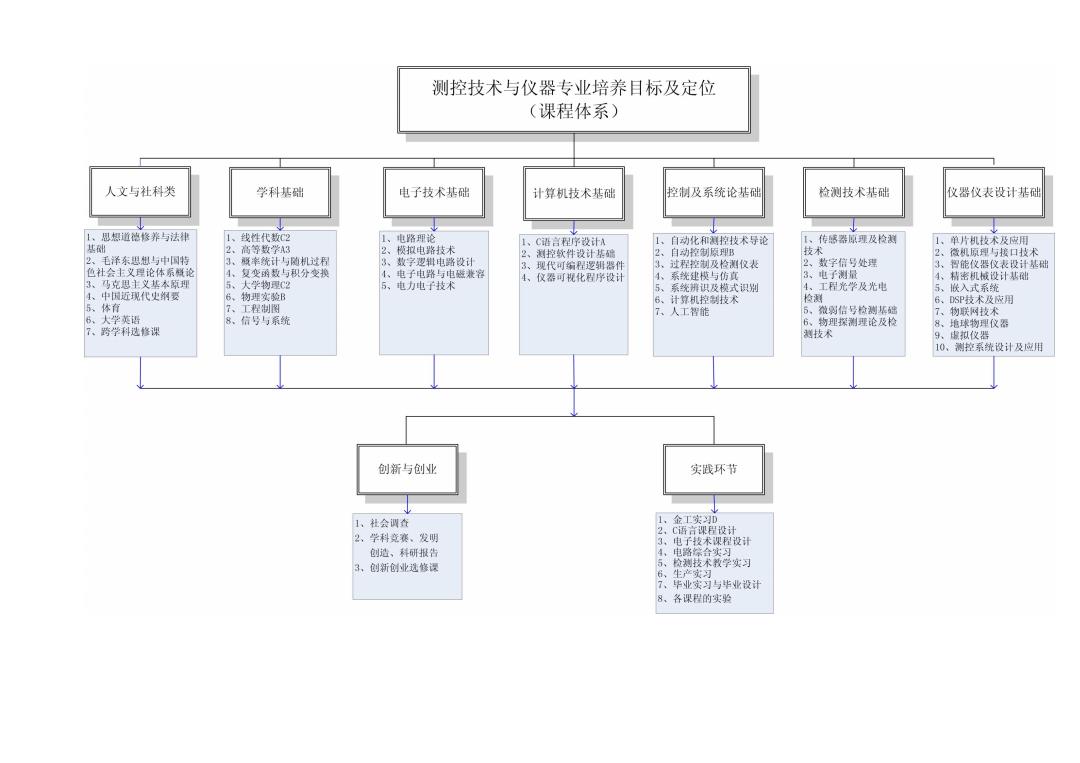
测控技术与仪器专业培养目标及定位 (课程体系) 人文与社科类 学科基础 电子技术基础 计算机技术基础 控制及系统论基础 检测技术基础 仪器仪表设计基础 1、恩想道德修养与法 1、线性代数C2 1、电路理论 1、C语言程序设计A 1、自动化和测控技术导论 1、传感器原理及检划 1、单片机枝术及应用 其 2、高等数学A3 2、模拟电路技术 2、测控饮件设计基瑞 2、自动控制原理B 技术 2、微机原理与接口技术 2、毛泽东思想与中国特 3、率统计与随机过 3、数字逻辑电路设计 3、现代可编程逻辑器件 3、过程控制及检测仪表 2、数字信号处理 3 智能仪器仪表设计基础 色社会主义理论体系论 4、复变函数与积分变换 、电子电路与电磁张容 4、仪器可视化程序设计 4、 系统建模与仿真 3、电子测量 4, 精密机械设计基础 3、马克思主义基本原理 5、 大学物理C2 5、,电力电子技术 5 系统携识及榄式识别 4、工程光学及光电 5, 帐入式系统 4、中园近现代史纲要 6 物理实验B 6、计算机控制技术 检 6. DSP技术及应用 5、体有 7、工程制图 7、人工智能 5, 微则信号检测基础 7、 物联网技术 6、大学英语 8、信号与系统 6、物理探测理论及检 8、地球物理仪器 7、跨学科达修课 测技术 9、虚拟仪器 10、测控系统设计及应用 创新与创业 实践环节 1、社会谓查 1,金工实习D 2、学科意赛、发明 2,C语言课程设计 3,电子技术课程设引 创造、科研报告 4,电路综合实习 3、创新创业选修课 检测技术教学实习 生产或习 7、毕业实习与毕业设计 8、各课程的实
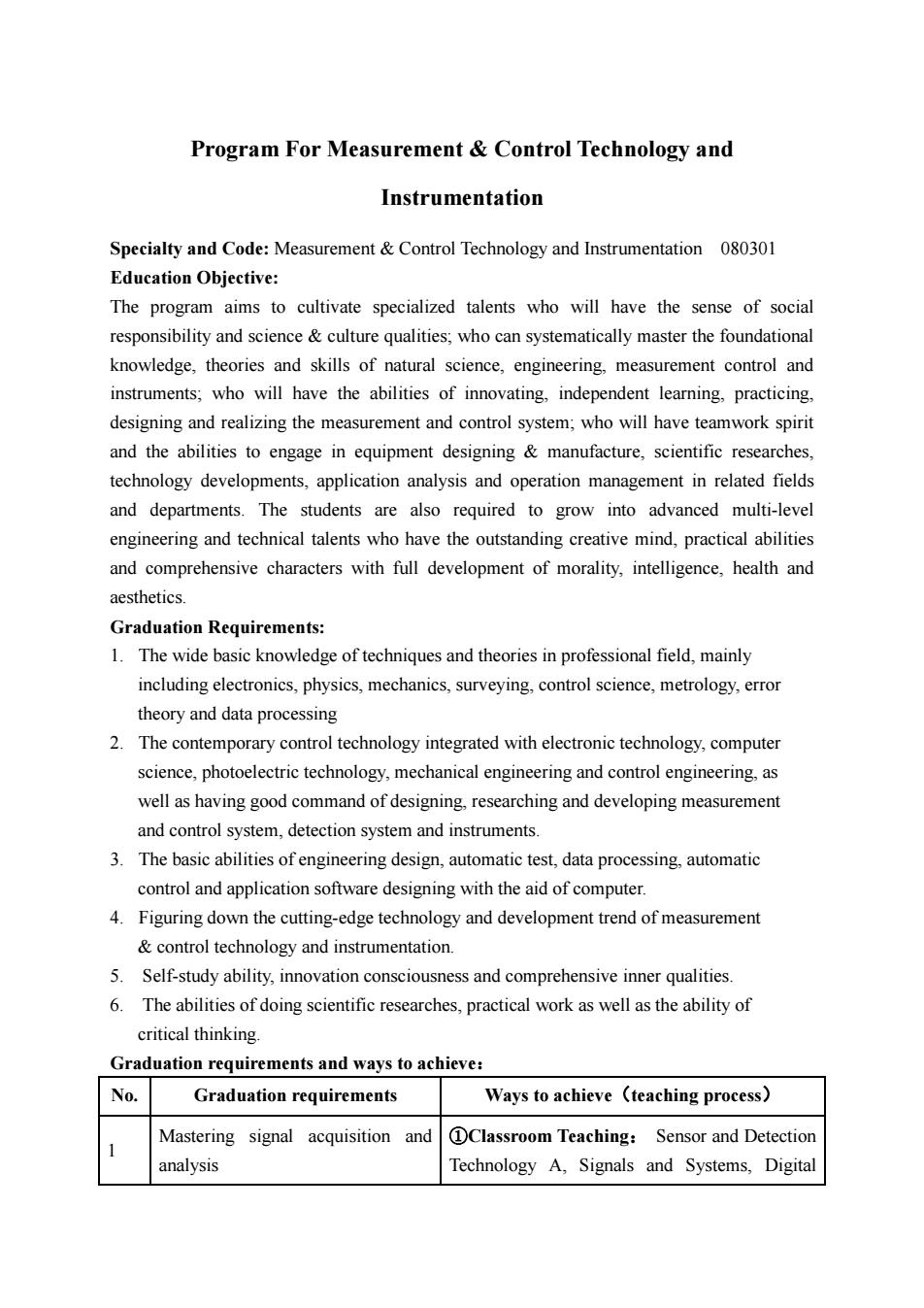
Program For Measurement Control Technology and Instrumentation Specialty and Code:Measurement Control Technology and Instrumentation 080301 Education Objective: The program aims to cultivate specialized talents who will have the sense of social responsibility and science culture qualities;who can systematically master the foundational knowledge,theories and skills of natural science,engineering,measurement control and instruments;who will have the abilities of innovating,independent learning,practicing, designing and realizing the measurement and control system;who will have teamwork spirit and the abilities to engage in equipment designing manufacture,scientific researches, technology developments,application analysis and operation management in related fields and departments.The students are also required to grow into advanced multi-level engineering and technical talents who have the outstanding creative mind,practical abilities and comprehensive characters with full development of morality,intelligence,health and aesthetics. Graduation Requirements: 1.The wide basic knowledge of techniques and theories in professional field,mainly including electronics,physics,mechanics,surveying,control science,metrology,error theory and data processing 2.The contemporary control technology integrated with electronic technology,computer science,photoelectric technology,mechanical engineering and control engineering,as well as having good command of designing,researching and developing measurement and control system,detection system and instruments. 3.The basic abilities of engineering design,automatic test,data processing,automatic control and application software designing with the aid of computer. 4.Figuring down the cutting-edge technology and development trend of measurement control technology and instrumentation. 5.Self-study ability,innovation consciousness and comprehensive inner qualities. 6.The abilities of doing scientific researches,practical work as well as the ability of critical thinking. Graduation requirements and ways to achieve: No. Graduation requirements Ways to achieve (teaching process) Mastering signal acquisition and 1Classroom Teaching:Sensor and Detection analysis Technology A,Signals and Systems,Digital
Program For Measurement & Control Technology and Instrumentation Specialty and Code: Measurement & Control Technology and Instrumentation 080301 Education Objective: The program aims to cultivate specialized talents who will have the sense of social responsibility and science & culture qualities; who can systematically master the foundational knowledge, theories and skills of natural science, engineering, measurement control and instruments; who will have the abilities of innovating, independent learning, practicing, designing and realizing the measurement and control system; who will have teamwork spirit and the abilities to engage in equipment designing & manufacture, scientific researches, technology developments, application analysis and operation management in related fields and departments. The students are also required to grow into advanced multi-level engineering and technical talents who have the outstanding creative mind, practical abilities and comprehensive characters with full development of morality, intelligence, health and aesthetics. Graduation Requirements: 1. The wide basic knowledge of techniques and theories in professional field, mainly including electronics, physics, mechanics, surveying, control science, metrology, error theory and data processing 2. The contemporary control technology integrated with electronic technology, computer science, photoelectric technology, mechanical engineering and control engineering, as well as having good command of designing, researching and developing measurement and control system, detection system and instruments. 3. The basic abilities of engineering design, automatic test, data processing, automatic control and application software designing with the aid of computer. 4. Figuring down the cutting-edge technology and development trend of measurement & control technology and instrumentation. 5. Self-study ability, innovation consciousness and comprehensive inner qualities. 6. The abilities of doing scientific researches, practical work as well as the ability of critical thinking. Graduation requirements and ways to achieve: No. Graduation requirements Ways to achieve(teaching process) 1 Mastering signal acquisition and analysis ①Classroom Teaching: Sensor and Detection Technology A, Signals and Systems, Digital
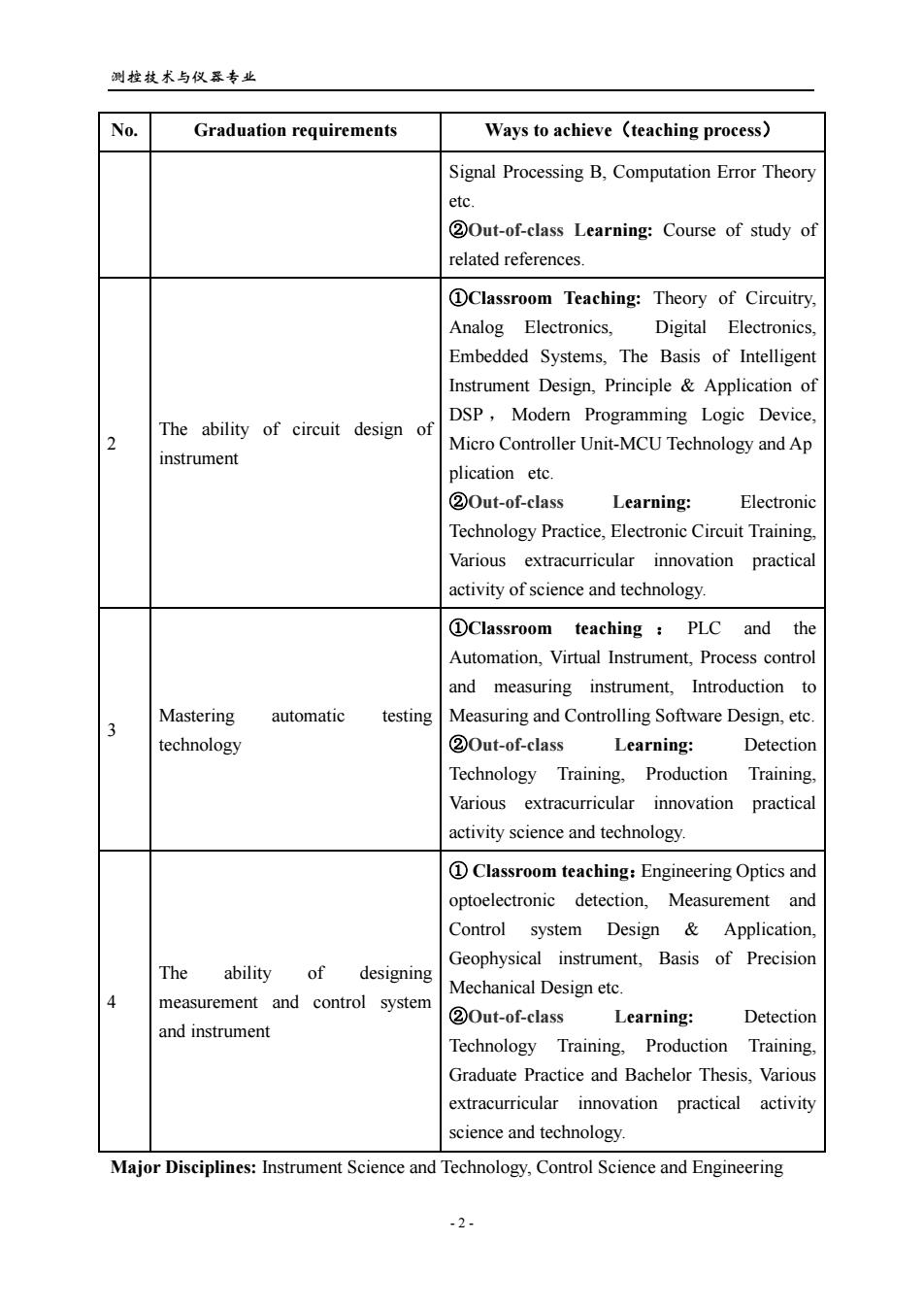
测控技术与仪器专业 No. Graduation requirements Ways to achieve (teaching process) Signal Processing B,Computation Error Theory etc. 2Out-of-class Learning:Course of study of related references. DClassroom Teaching:Theory of Circuitry, Analog Electronics,Digital Electronics, Embedded Systems,The Basis of Intelligent Instrument Design,Principle Application of DSP,Modern Programming Logic Device, The ability of circuit design of Micro Controller Unit-MCU Technology and Ap instrument plication etc. ②0ut-of-class Learning: Electronic Technology Practice,Electronic Circuit Training, Various extracurricular innovation practical activity of science and technology. ①Classroom teaching:PLC and the Automation,Virtual Instrument,Process control and measuring instrument,Introduction to Mastering automatic testing Measuring and Controlling Software Design,etc. technology ②Out-of-class Learning: Detection Technology Training,Production Training, Various extracurricular innovation practical activity science and technology. 1 Classroom teaching:Engineering Optics and optoelectronic detection,Measurement and Control system Design Application, Geophysical instrument,Basis of Precision The ability of designing Mechanical Design etc. 4 measurement and control system 2Out-of-class Learning: Detection and instrument Technology Training,Production Training, Graduate Practice and Bachelor Thesis,Various extracurricular innovation practical activity science and technology. Major Disciplines:Instrument Science and Technology,Control Science and Engineering -2-
测控技术与仪器专业 - 2 - No. Graduation requirements Ways to achieve(teaching process) Signal Processing B, Computation Error Theory etc. ②Out-of-class Learning: Course of study of related references. 2 The ability of circuit design of instrument ①Classroom Teaching: Theory of Circuitry, Analog Electronics, Digital Electronics, Embedded Systems, The Basis of Intelligent Instrument Design, Principle & Application of DSP , Modern Programming Logic Device, Micro Controller Unit-MCU Technology and Ap plication etc. ②Out-of-class Learning: Electronic Technology Practice, Electronic Circuit Training, Various extracurricular innovation practical activity of science and technology. 3 Mastering automatic testing technology ①Classroom teaching : PLC and the Automation, Virtual Instrument, Process control and measuring instrument, Introduction to Measuring and Controlling Software Design, etc. ②Out-of-class Learning: Detection Technology Training, Production Training, Various extracurricular innovation practical activity science and technology. 4 The ability of designing measurement and control system and instrument ① Classroom teaching:Engineering Optics and optoelectronic detection, Measurement and Control system Design & Application, Geophysical instrument, Basis of Precision Mechanical Design etc. ②Out-of-class Learning: Detection Technology Training, Production Training, Graduate Practice and Bachelor Thesis, Various extracurricular innovation practical activity science and technology. Major Disciplines: Instrument Science and Technology, Control Science and Engineering